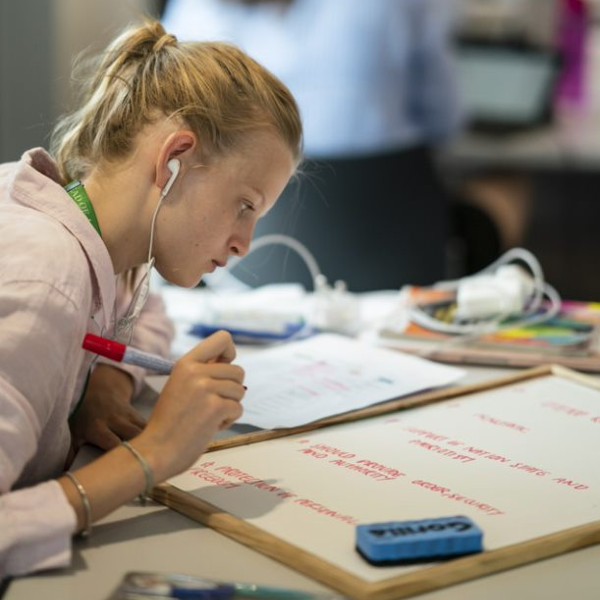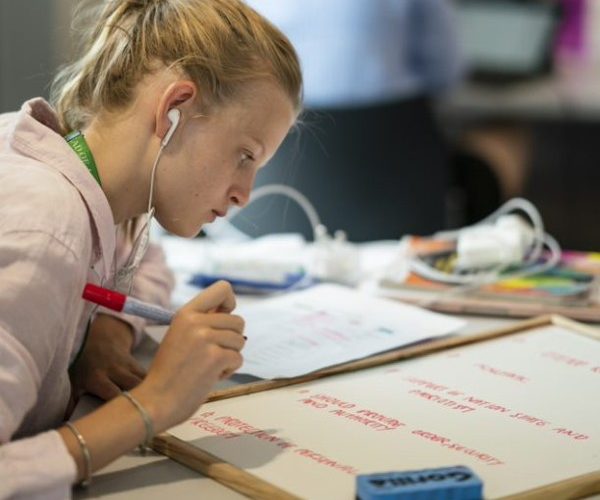Are you wondering how to do an Extended Project Qualification (EPQ) outside of school? In this article, we’ll guide you through the process step by step.
With the rising popularity of EPQs, it’s crucial to have the right information to succeed in your independent academic journey. According to recent data, more students are pursuing EPQs independently, seeking the freedom to explore their interests.
Now, let’s dive in and get your questions answered.

Table of contents
What is an EPQ
According to Wikipedia, some students in England and Wales undertake Extended Project Qualification (EPQ), which is equal to 50% of an A-Level. It is a level three national qualifications framework course with grades ranging from A* to E with a maximum UCAS tariff point value of 28.
Following a 2009 suggestion by the exam boards of England and Wales (Edexcel, OCR, AQA, WJEC, Eduqas, and CIE), as well as England’s former qualifications authority, the QCA, all students may now take an extended project as a free-standing qualification.
By fostering abilities in research, critical thinking, and extended writing, it was believed that students would be better equipped to study at university or start their careers.
There are no restrictions on the topic a student may choose, but they must show that it is academically relevant, either as an addition to their current course of study or as a component of their intended career path. It can take the shape of a dissertation (5,000 words is a typical length recommendation) or a variety of different formats, such as a report or artifact that is accompanied by supporting documentation or a musical or dramatic production.
An extended project is “a single piece of work requiring a high degree of planning, preparation, research, and autonomous working,” according to the QCA.
See also: What Does FHEQ Level 4 Mean? The Frameworks for Higher Education Qualifications of UK
Can I Do an EPQ Outside of School?
Yes, you can! Doing an EPQ outside of school is entirely possible, and many students opt for this route to gain more independence and explore their interests.
EPQs, short for Extended Project Qualifications, are not exclusive to the confines of school walls. Many students opt to pursue their EPQ outside of school to gain more autonomy in their academic journey. This independent approach is not only possible but also increasingly popular.
To start, it’s essential to grasp that the option of undertaking an EPQ outside of school is widely accessible. The process is designed to be flexible, allowing students to explore their interests beyond the traditional classroom setting. This adaptability is what makes EPQs a valuable opportunity for self-driven learners.
When considering whether to embark on this independent academic endeavor, simplicity in understanding the concept is key. Essentially, an EPQ is a chance for you to choose a subject you’re passionate about and delve into it deeply. It’s a project where you can explore your curiosity and showcase your ability to research, analyze, and communicate your findings effectively.
The beauty of doing an EPQ outside of school lies in the freedom it offers. Unlike some structured educational programs, you have the autonomy to select your topic, set your goals, and create your timeline.
See also: How Long is Sixth Form in the UK? A Guide To Private Sixth Form In The UK
How Do You Apply for an Online EPQ Course?
So, you’re interested in an online EPQ course? Great choice! Applying for one is straightforward and accessible. First, you should start by searching online for institutions or platforms that offer online EPQ courses. Many websites provide information on available courses and their requirements.
Once you’ve found a suitable option, the next step is to sign up or create an account on their platform. This usually involves providing some basic personal information like your name, email address, and sometimes your educational background.
After creating your account, you’ll need to navigate to the course you want to take. These courses often have detailed descriptions, including the syllabus, duration, and any prerequisites. Make sure to read through these details carefully to ensure the course aligns with your goals and interests.
Now, it’s time to enroll. The process typically involves clicking a button that says “Enroll” or “Register.” You might need to pay a fee if it’s a paid course, but many platforms offer free EPQ courses as well.
Once you’ve enrolled, you’ll likely gain access to the course materials and resources. Don’t forget to check if there are specific start dates for the course, and mark them on your calendar.
See also: Can You Apply to the Same University Twice?
What Are the Benefits of an EPQ?
An EPQ not only enhances your academic skills but also boosts your university applications. It demonstrates your research, critical thinking, and time management abilities. Here’s a piece of detailed information on the benefits of an EPQ (Extended Project Qualification).
#1. Expanded Opportunities for Learning
EPQs offer students a unique chance to delve deeply into a subject they’re passionate about. This helps to foster a love for learning beyond the regular curriculum.
#2. Improved Research and Analytical Skills
EPQs require extensive research and analysis, helping students develop critical thinking and problem-solving abilities that are valuable in various academic and professional settings.
#3. Enhanced Time Management
Managing a long-term project like an EPQ helps students improve their time management skills, which are crucial for success in higher education and future careers.
#4. Independent Learning
EPQs encourage independent study and self-motivation, preparing students for the self-directed learning often required in university courses.
#5. Preparation for Higher Education
Completing an EPQ mirrors the type of research and coursework expected at the university level, giving students a head start in their academic journey.
#6. Improved Communication Skills
Presenting and defending your EPQ project in front of peers or examiners enhances your communication skills, which are vital in any profession.
#7. Personal Growth and Confidence
Completing a significant project like an EPQ boosts self-confidence and helps students realize their capabilities.
An Extended Project Qualification offers a multitude of benefits, from academic and personal growth to improved career prospects. It fosters independent learning, critical thinking, and time management skills while also expanding horizons and opening doors to higher education and future careers. Moreover, it’s an opportunity for students to discover their passions and gain a competitive edge in their academic and professional pursuits.
See also: What Are The Different Types of Academic Qualifications in 2023?
How Do I Choose an EPQ Topic?
Selecting the right topic is crucial. Begin by brainstorming your interests, and then narrow down your choices based on feasibility and available resources. Selecting a suitable topic for your Extended Project Qualification (EPQ) can be a crucial decision in your academic journey. Here’s a guide to help you make the right choice:
- Reflect on Your Interests: Begin by considering your passions and interests. Think about subjects that genuinely intrigue you, as this will keep you motivated throughout the project.
- Identify Your Strengths: Assess your strengths in different subjects. Choose a topic in which you feel confident and have some prior knowledge.
- Consider Future Goals: Reflect on your future academic or career goals. Your EPQ topic can be an opportunity to explore a subject related to your aspirations.
- Research Potential Topics: Read widely on various subjects to generate ideas. Utilize books, articles, and online resources to gather information.
- Narrow Down Your Options: Once you have a list of potential topics, narrow it down to a few that you find most compelling.
- Consult with Teachers: Seek advice from your teachers or advisors. They can provide valuable insights and help you evaluate the feasibility of your chosen topics.
In essence, selecting an EPQ topic is a process that involves self-reflection, research, and careful consideration. By following these steps and considering your interests, strengths, and future goals, you can choose a topic that will make your EPQ journey both engaging and rewarding.
See also: How to Choose the Right Research Topic in Step By Step Guide
Where Can I Find Resources for My EPQ?
Locating resources for your Extended Project Qualification (EPQ) is essential to ensure a well-rounded and informed research process.
Here’s a comprehensive guide to help you find the materials you need:
- Library Databases: Begin your search by exploring your school or local library’s databases. These digital collections often include academic journals, books, and articles that are invaluable for research.
- Online Libraries: Access digital libraries such as Google Scholar, JSTOR, and Project Gutenberg. They provide access to a vast array of academic publications and books.
- Educational Websites: Educational websites like Khan Academy, Coursera, and edX offer free courses and resources on various subjects, aiding your understanding of complex topics.
- Government and NGO Websites: Government websites, as well as those of non-governmental organizations (NGOs), often provide authoritative reports, statistics, and research findings.
- Online Forums: Join online forums or communities related to your topic. Platforms like Reddit or Quora can connect you with experts and enthusiasts who may recommend valuable resources.
See also: How To Write An EPQ Essay till Conclusion (Step-by-Step Guide)
How to Avoid Plagiarism in My EPQ?
Plagiarism can have serious consequences. Always cite your sources properly, use plagiarism-detection tools, and understand the importance of academic integrity.
When undertaking your Extended Project Qualification (EPQ), maintaining academic integrity is paramount. Plagiarism, the act of using someone else’s work or ideas without proper acknowledgment, can have severe consequences on your academic journey.
To help you avoid this issue, we will explore some practical strategies to ensure your EPQ remains authentic and original.
Understand the Basics
To start, it’s crucial to grasp what plagiarism entails. Plagiarism can range from copying and pasting entire paragraphs to simply failing to cite a source correctly. Therefore, awareness of the different forms of plagiarism is the first step in avoiding it.
Cite Sources Properly
One effective method to prevent plagiarism is to cite your sources properly. When using someone else’s words, ideas, or data, make sure to attribute them through appropriate citation styles, such as APA, MLA, or Chicago. This practice acknowledges the original creator and adds credibility to your work.
Use Quotation Marks
Whenever you directly quote a source, enclose the text in quotation marks. This clearly distinguishes the borrowed content from your own and shows that you are acknowledging the source.
Paraphrase Effectively
Avoiding consecutive sentences copied from sources is crucial. Instead, paraphrase the information in your own words. However, ensure that your paraphrased content still reflects the original idea accurately. Over-reliance on passive voice can make your writing seem less original, so strive for active sentence construction.
See also: What Happens if You Get Caught Plagiarising In a University in the UK?
FAQS
An EPQ is an independent research project that allows you to explore a topic of your choice in-depth. Some students choose to do it outside of school to have more flexibility in topic selection and scheduling.
The timeframe can vary, but it’s typically done over several months. Plan your schedule carefully and consider your submission deadline.
Yes, many universities value EPQs as they demonstrate your research and independent study skills. Check with your chosen universities for specific requirements.
The format may vary, but it’s common to submit a written report and deliver a presentation. Follow your EPQ guidelines for formatting details.
Don’t hesitate to reach out to your supervisor, teachers, or peers for guidance and support. They can provide valuable assistance when you encounter difficulties. Remember, EPQs can be a rewarding experience that allows you to delve into a subject you’re passionate about and develop valuable research and presentation skills.
Conclusion
Embarking on an EPQ journey outside of school can be a rewarding experience.
By addressing these common queries and following our tips, you’ll be well-prepared to excel in your EPQ and university modules, ensuring a bright academic future ahead.
Doing an EPQ outside of school requires seeking answers to questions independently, fostering self-directed learning and time management.
References
- Wikipedia.org – Extended Project Qualification
- Studyin-uk – Taking the Extended Project Qualification (EPQ)
- Universitycompare.com – What is An EPQ?
Recommendations
- How Long is Sixth Form in the UK? A Guide To Private Sixth Form In The UK
- How To Write An EPQ Essay till Conclusion (Step-by-Step Guide)
- When Do Year 13 (Sixth Forms) Finish School in 2023?
- How To Become A Social Worker? What Qualifications Do You Need?
- What Are A-Level Qualifications? Everything You Need To Know About The A-Levels
- What are AAT Qualifications?
- What Are Level 4 Qualifications Equivalent in Grades in the UK?
- What Are Level 3 Qualifications in the UK?



